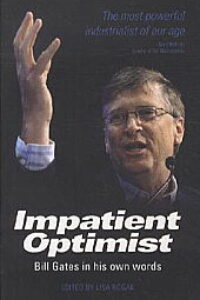Dieses Buch enthält eine Fülle von Zitaten von Bill Gates. Die Anordnung ist etwas befremdlich, denn sie ist alphabetisch gegliedert und nicht nach Sachthemen. Es lohnt sich aber, darin zu blättern, denn insbesondere als Unternehmer oder als Manager findet man zahlreiche Zitate, über die es sich nachzudenken lohnt.
Besonders treffend fand ich Äußerungen von Gates, die darauf zielen, dass eine Firma nie selbstzufrieden sein darf, sich nicht auf Erfolgen ausruhen sollte und mehr über ihre Fehler reden sollte als über das, was gut läuft. Hier einige Zitate zu diesem Thema:
„There is a tendency in companies to let good news travel fast. Oh, we just won this account. Oh, things went so well. But, the thing about good news is, it’s generally not actionable… Bad news, on the other hand, is actionable. This customer is not very happy. This competitor is doing something very well. This project is behind… The sooner you get the bad news, the better off you’re going to be, in order to kind of absorb it, to change your product plan, to go back and talk to the people, really dig into it.“ (S. 22)
„Your most unhappy customers are your greatest source of learning.“ (S. 27)
„We never waste a lot of time talking about what we’re doing well. It just isn’t our culture. Every meeting is about ‚Sure, we won in seven of the categories, but what about the eighth category?“ (S. 50)
„I’ve always been hardcore about looking at what we did wrong. We’re not known for reflecting back on the things that went well. We can be pretty brutal about the parts that don’t do well.“ (S. 55)
„We’ve never had a culture where we say, ‚Boy, we’re in great shape,‘ because we know how dynamic the industry really is. We know we have to replace our products in a dramatic way.“ (S. 89)
„There is plenty of challenge, which is why it’s good we’re not a culture that looks back and has to waste a lot of time celebrating what we have done well.“ (S. 89)
„We’re always thinking about what we have missed that could keep us on top.“ (S. 91)
Mich haben diese Zitate besonders angesprochen, weil ich glaube, dass es ein wesentliches Erfolgsgeheimnis für Unternehmen ist, nicht selbstzufrieden und überheblich zu werden und ständig nach Dingen zu suchen, in denen man nicht gut ist. Das ist natürlich unbequemer für alle Beteiligten, als sich selbst zu feiern. Aber es ist der wichtigste Garant für langfristigen Erfolg. In meinem Buch „Setze dir größere Ziele“ habe ich ein Kapitel mit der Überschrift „Der Motor der Unzufriedenheit“ geschrieben. Hätte ich diese Zitate gekannt, dann hätten sie hervorragend in dieses Kapitel gepasst.
Ein anderes wichtiges Erfolgsgeheimnis von Microsoft war, dass man die Mitarbeiter eher von der Hochschule holte als von anderen Unternehmen, wo sie möglicherweise durch eine abweichende Firmenkultur schon „verdorben“ waren. „Our hiring was always focused on people right out of school. We had a few key hires like Charles Simonyi who came in with experience. But most of our developers, we decided that we wanted them to come with clear minds, not polluted by some other approach, to learn the way that we liked to develop software, and to put the kind of energy into it that we thought was key.“ (S. 68) R.Z.






